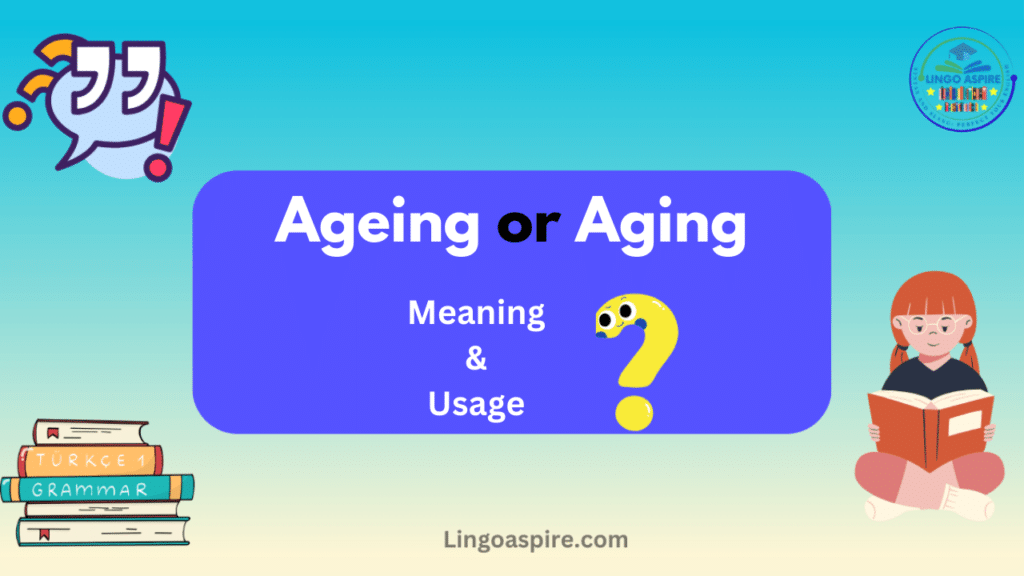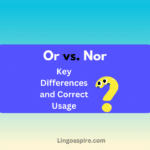Language changes, and words evolve based on cultural and regional influences. One such example is ageing or aging, two spellings of the same word used in different parts of the world. This small spelling difference confuses many, especially writers, students, and professionals in the medical research and skincare brands industries. Understanding these variations is essential, particularly when writing for international audiences or following specific style guides.
The difference between aging and ageing lies in their geographical usage. “Aging” is the preferred spelling in American English, while “ageing” is commonly used in British English and many other English-speaking countries. Both spellings refer to the aging process, including biological changes, cognitive function decline, and the effects of time on the human body and mind. However, while the spelling varies, the meaning remains the same.
Ageing or Aging: Key Differences

Many people wonder why two spellings exist for the same word. The answer lies in the way English evolved in different regions. British English often retains older spellings from Latin or French, while American English simplifies spellings for consistency and ease.
The spelling difference between “aging” and “ageing” follows the general rule of dropping the “e” before adding “-ing” in American English. This pattern appears in words like “argue → arguing” and “age → aging.” However, British English exceptions allow “ageing” to keep the “e” for smoother pronunciation.
A table highlighting regional spelling differences:
| Word | British English | American English |
|---|---|---|
| Ageing/Aging | Ageing | Aging |
| Colour/Color | Colour | Color |
| Favourite/Favorite | Favourite | Favorite |
| Travelling/Traveling | Travelling | Traveling |
Authors in academic and scientific journals often follow regional style guides, such as the Oxford Style Manual in Britain or the Chicago Manual of Style in the United States. These guides dictate which spelling to use based on the publication’s target audience.
How to Use “Ageing or Aging” Correctly
The correct choice depends on where you are and who your audience is. In the United States, “aging” appears in healthcare policies, government reports, and National Institute on Aging publications. In contrast, “ageing” dominates British English texts, including those from the World Health Organization (WHO) and European medical research studies.
Examples in context:
- “The aging population in the U.S. has led to changes in healthcare policies.”
- “The ageing population in the U.K. is increasing demand for senior care facilities.”
- “Many skincare brands focus on anti-aging products to target wrinkles and fine lines.”
- “Healthy ageing is a priority for governments looking to improve the lives of Older People.”
Some industries have specific preferences. Marketing and branding teams in the beauty industry often use “anti-aging” because the U.S. dominates this market. In contrast, scientific journals in Europe use “anti-ageing” to align with British spelling norms.
Synonyms for Ageing or Aging
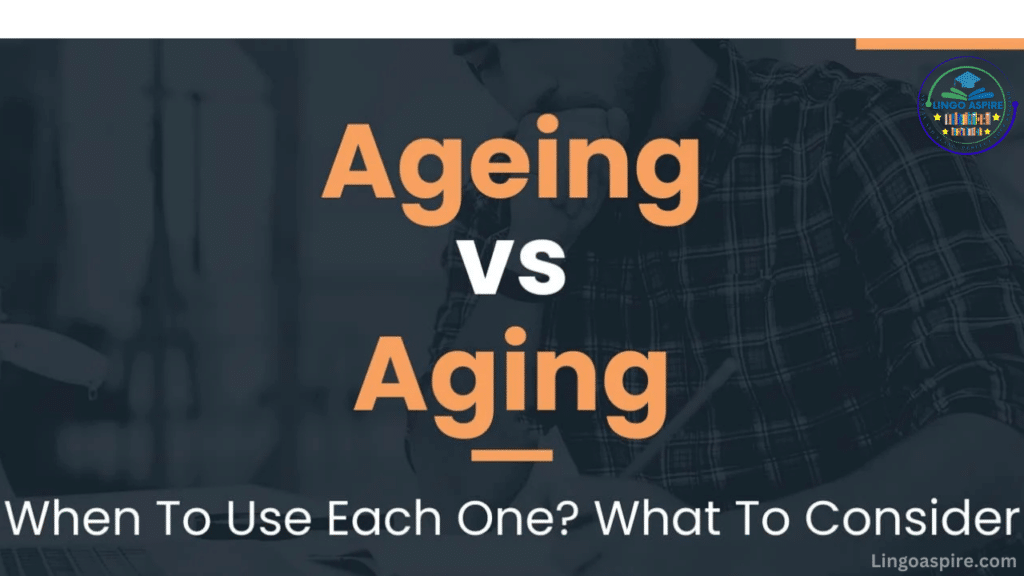
| Synonym | Description |
|---|---|
| Senescence | The biological process of growing old. |
| Maturation | The process of reaching full development. |
| Decline | A gradual deterioration in strength or quality. |
| Advancing years | The progression of time leads to old age. |
| Elderhood | The stage of life beyond middle age. |
| Growing older | The natural progression of aging. |
| Ripening | The process of becoming fully developed, often used metaphorically. |
| Timeworn | Showing signs of age and wear. |
| Wrinkling | The formation of wrinkles as a result of aging. |
| Longevity | The length or duration of a person’s life. |
| Fossilization | A humorous or exaggerated term for becoming old. |
Common Questions About Ageing or Aging
Many writers and professionals question which spelling is correct for formal writing. The best approach is to stay consistent with the style guide or region you are writing for. The meaning of aging and meaning of ageing remain the same, but consistency matters in professional communication.
- Which spelling should I use in my writing? If writing for a British audience, use ageing. If targeting an American audience, use aging.
- Do “aging” and “ageing” have different meanings? No, both words refer to the aging process, including biological changes, wrinkles, and health effects over time.
- Why do some publications use “anti-aging” while others use “anti-ageing”? The preference depends on regional spelling rules. U.S. publications use anti-aging, while U.K. sources use anti-ageing.
Real-Life Usage of Ageing or Aging
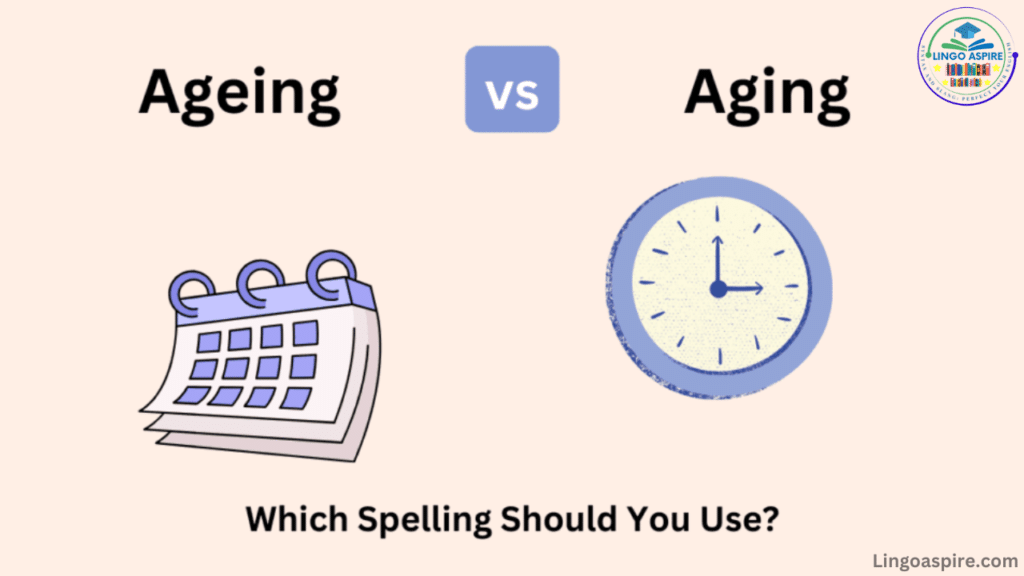
The choice between “aging” and “ageing” affects various industries and everyday communication. Here are some real-world examples of how each spelling appears in different contexts:
Medical and Scientific Research
- American English: The National Institute on Aging (NIA) in the U.S. funds research on diseases like Alzheimer’s, studying the aging process and ways to enhance cognitive function in older adults.
- British English: The World Health Organization (WHO) promotes “healthy ageing” as part of its global healthcare strategy, emphasizing biological changes and the psychological impact of growing older.
Marketing and Skincare Brands
- American English: Major U.S. beauty companies such as L’Oréal and Neutrogena label products as “anti-aging creams” to attract consumers looking for solutions to wrinkles and fine lines.
- British English: European and Australian skincare lines often use “anti-ageing” on product labels and advertisements to align with regional language preferences.
Government and Healthcare Policies
- American English: The U.S. government uses “aging” in official documents, such as the “Aging and Disability Resource Centers” initiative, which supports older adults and disabled individuals.
- British English: The UK government and the NHS refer to “ageing populations” when discussing mature care programs and funding strategies.
News and Media Publications
- American English: Newspapers like The New York Times and The Washington Post use “aging” in health and wellness articles discussing longevity and aging well.
- British English: The Guardian and BBC News follow the “ageing” spelling, especially in reports related to public health and senior welfare.
Understanding the difference between aging and ageing ensures accuracy and professionalism in writing, whether for scientific reports, branding, or daily communication.
Common Mistakes and How to Avoid Them
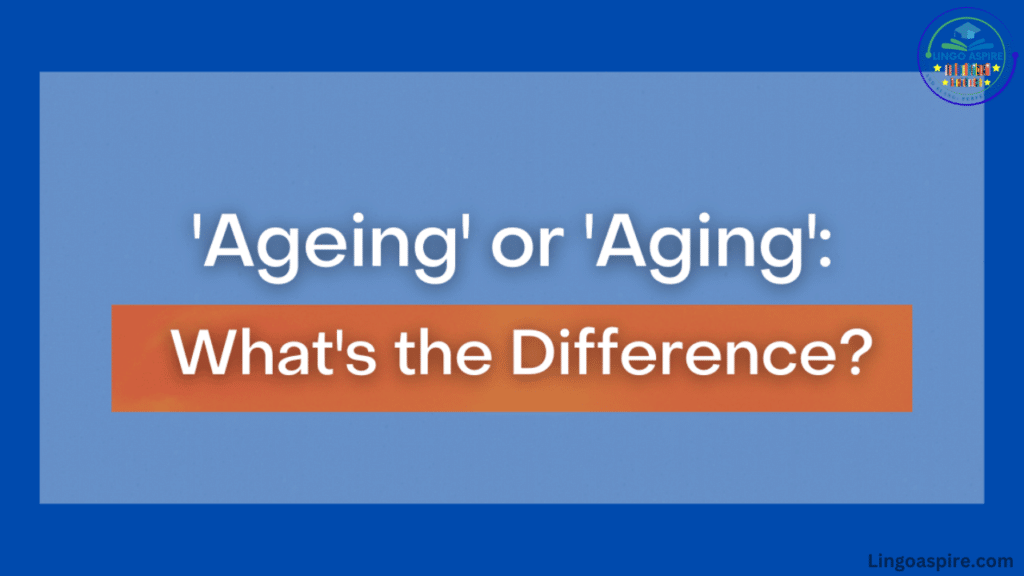
Many people make errors when using “aging” and “ageing,” especially in writing. Here are some common mistakes and how to avoid them:
- Mixing British and American English in the Same Document
Using “aging” in one paragraph and “ageing” in another creates inconsistency. Choose one spelling based on your audience and stick to it throughout the document. - Incorrect Use in Scientific and Academic Writing
Many scientific journals require consistency with British or American English. Always check the style guides relevant to your publication to avoid unnecessary revisions. - Spelling Errors in Marketing and Branding Materials
Skincare brands and anti-aging products often target international audiences. Ensure your spelling matches the intended market’s preferences. U.S.-based campaigns should use “anti-aging,” while European campaigns should use “anti-ageing.” - Assuming One Spelling is Incorrect
Some people mistakenly believe one spelling is incorrect. Both “aging” and “ageing” are correct in their respective regions. Understanding the spelling difference ensures better communication and credibility in professional writing. - Not Updating Auto-Correct Settings
Many word processors default to either British or American spelling. If you frequently write for a specific audience, adjust your settings to avoid unnecessary corrections.
Final Thoughts
The difference between aging and ageing is purely a spelling difference based on regional language preferences. Whether you use “aging” or “ageing,” the word describes the natural aging process, including cognitive function decline, psychological effects of aging, and biological changes that come with time.
To ensure accuracy, check the style guides relevant to your audience. Whether you’re writing about healthy ageing, longevity, or aging gracefully, consistency in spelling will enhance clarity and professionalism. Regardless of spelling, aging remains an inevitable part of life, and understanding it helps us navigate its challenges and opportunities.
Sources
- National Institute on Aging (NIA): Description: The NIA is a U.S. government research institute focused on aging and mature health. It provides scientific studies on biological changes, cognitive function, and the aging process. Their research influences healthcare policies and guides professionals in gerontology and medicine.
- World Health Organization (WHO) – Healthy Ageing: Description: WHO is a global authority on public health and healthy ageing. They set international standards for mature care, promote aging well, and develop policies for older people worldwide. Their reports help shape medical research and government initiatives on longevity and aging gracefully.
- Cambridge Dictionary – Aging vs. Ageing: Description: Cambridge Dictionary provides authoritative definitions and grammatical explanations of words. It clarifies the difference between aging and ageing, explaining the spelling difference between British English and American English. This source is essential for writers following different style guides.

